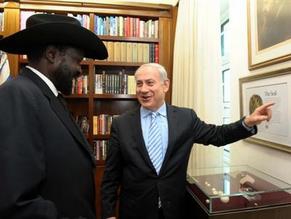|
World Jewish News

South Sudan President Salva Kiir (L) with Israel's Prime Minister Benjamin Netanyahu.
|
President of South Sudan visits Yad Vashem and meets Israel’s leaders
22.12.2011, Israel and the World South Sudan President Salva Kiir visited Yad Vashem Tuesday as part of his first visit to Israel.
Accompanied by four government ministers and Yad Vashem Chairman Avner Shalev, Kiir toured the Holocaust History Museum and Hall of Names, before participating in a memorial ceremony in the Hall of Remembrance where he laid a wreath on the concrete slab under which are ashes from the extermination camps.
Kiir met Israeli President Shimon Peres during the morning, then held a working lunch with Prime Minister Benjamin Netanyahu on a flying visit of less than 24-hours.
"I am very moved to come to Israel and to walk on the soil of the promised land," Israeli President Peres's office quoted Kiir as saying.
"As a nation that rose from dust, and as the few who fought the many, you have established a flourishing country that offers a future and economic prosperity to its children," Kiir said. "I have come to see your success."
Israel's premier and president pledged their support for the fledgling state of South Sudan in talks with visiting President Kiir.
Peres said that as Deputy Defence minister he had met with south Sudanese leaders in the 1960s when Israel gave them "extensive assistance in agriculture and infrastructures."
"Israel has supported, and will continue to support, your country in all areas in order to strengthen and develop it," Peres said.
Following talks with Netanyahu, his bureau announced that an Israeli delegation "would shortly go to South Sudan in order to examine how to aid the people, who underwent great suffering in recent years, to develop their new state."
Kiir met Defence Minister Ehud Barak and Foreign Minister Avigdor Lieberman in the afternoon before leaving in the early evening.
Israel recognized South Sudan and established full diplomatic relations with Kiir's government shortly after it declared independence in July following a 22-year civil war with the mostly-Muslim north.
The Jewish state does not have relations with Khartoum, which it has accused of serving as a base for Islamic militants, and instead supported the rebel movement of the mainly Christian and animist south during the war.
Israel's ties with the rebel Sudan People's Liberation Movement, which is now the south's ruling party, have long been close, with the Jewish state allegedly providing arms during the war, although neither side has publicly acknowledged any weapons transfers.
Tuesday's meetings were expected to focus on the issue of Sudanese illegal migrants to Israel.
Thousands of migrants from the former united Sudan, including hundreds from the south are currently in Israel, which seeks to repatriate them.
So far, this year, more than 12,000 illegals have sneaked across the Egyptian border into southern Israel, the vast majority of them economic migrants from Africa, prompting Israel to ramp up measures to stop the flow.
Netanyahu has said he will visit Africa in the coming months to discuss the issue of illegal immigration, but did not say which countries he would visit.
Press reports suggested he would travel in February to visit Ethiopia, Uganda and Kenya, but he was not expected to visit South Sudan out of security concerns.
EJP
|
|
